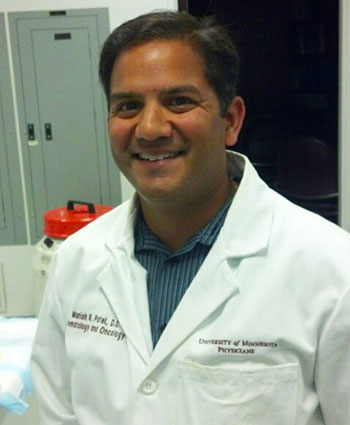2014 Research Fellow
Dr. Manish Patel – University of Minnesota
Dr. Manish Patel’s entire career has been focused on finding new treatments for lung cancer. After completion of residency at Northwestern University, he pursued an academic career in lung cancer research. He came to Minnesota in 2005 where he began research on the basic biology of lung cancers.
Upon completion of his fellowship in hematology and oncology at the University of Minnesota in 2010, he joined the faculty with an emphasis on lung cancer patient care and research. His goal is to translate findings in the laboratory to clinical trials for lung cancer to offer better treatments and ultimately a cure for lung cancer.
During his training, Dr. Patel developed an interest in studying live viruses as a therapy for lung cancer. Abnormalities in cancer cells can allow viruses to grow within them and kill them. Vesicular stomatitis virus, or VSV, is a virus that affects livestock, but is not pathogenic to humans. It has been further engineered to produce a key protein in our body’s defenses against viral infections, interferon-β. Production of interferon-β in a normal cell infected with VSV will rapidly inhibit spread of the virus, whereas cancer cells with defects in this pathway will allow viral replication. As a result, this virus efficiently kills cancer cells, while normal cells are not harmed.
In their preliminary experiments, vesicular stomatitis virus was highly effective against non-small cell lung cancer both in the culture dish and in mice with lung cancer. Some of the mice were cured of their lung cancer and were resistant to forming new tumors suggesting that VSV-IFNβ also resulted in an immune response against the tumors. Therefore, it is believed that that VSV-IFNβ will be an ideal therapy for lung cancer – resulting in both a direct cytotoxic effect specifically on the tumors and also an immune therapy resulting in long-term disease control.
The current focus of Dr. Patel’s lab team is to develop a strategy for bringing this therapy to clinical trials for lung cancer. The major barrier to virus therapy is that patients with cancer have an intact immune system and therefore, they must try to prevent the virus from circulating in the body. For metastatic lung cancer, this is a problem because it will limit the virus from reaching sites of metastatic tumors. Their approach is to use blood outgrowth endothelial cells (BOECs) as a carrier of the virus to the tumor. BOECs are unique cells derived from the blood, are easily cultured in the laboratory, and most importantly, circulate preferentially to sites of tumors. Dr. Patel and his team propose to use these cells as a “Trojan Horse” to carry VSV through the circulation hidden from the host immune system. In this way, they believe that BOECs will allow for effective virus therapy for metastatic lung cancer

